Illinois Supreme Court Rules Labor Costs Not Depreciated to Determine Actual Cash Value
November 19, 2021 —
Tred R. Eyerly - Insurance Law HawaiiThe Illinois Supreme Court determined that a homeowner insurer may not depreciate labor costs in calculating actual cash value (ACV) after a loss under the policy. Sproull v. State Farm Fire and Casualty Co., 2021 Ill. LEXIS 619 (Ill. Sept. 23, 2021).
Plaintiff was insured under a homeowner's policy that provided replacement cost coverage for structural damage. Under the policy, the insured would initially receive an ACV payment but then could receive replacement cost value (RCV) if repairs or replacement were completed within two years and the insurer was timely notified. The policy did not define "actual cash value."
Plaintiff suffered wind damage to his residence and timely submitted a property damage claim to State Farm. The adjuster determined that the building sustained a loss with RCV of $1711.54. In calculating ACV, State Farm began with the RCV and then subtracted plaintiff's $1000 deductible and an additional $394.36, including taxes, for depreciation. Plaintiff thus received an ACV payment of $317.18. Plaintiff claimed that he was underpaid on his ACV claim because State Farm depreciated labor, which is intangible and thus not subject to wear, tear, and obsolescence. Further, labor should not have been depreciated because it was not susceptible to aging or wearing and its value did not diminish over time.
Read the court decisionRead the full story...Reprinted courtesy of
Tred R. Eyerly, Damon Key Leong Kupchak HastertMr. Eyerly may be contacted at
te@hawaiilawyer.com
ACEC Statement on Negotiated Bipartisan Debt Limit Compromise
June 05, 2023 —
The American Council of Engineering CompaniesWashington, D.C. – The American Council of Engineering Companies (ACEC) released the following statement applauding the negotiated bipartisan compromise to raise the debt limit ahead of the scheduled House vote tonight:
"The American Council of Engineering Companies (ACEC) applauds President Biden and Speaker McCarthy for negotiating a bipartisan compromise to raise the debt limit and avoid a catastrophic default. We are particularly pleased that the bipartisan deal protects the critical funds provided under the Infrastructure Investment and Jobs Act (IIJA) and does not include any changes to the Inflation Reduction Act's (IRA) climate and clean energy provisions, which the engineering industry is working hard to deliver successfully. ACEC also strongly supports the provisions in the deal to reform the federal permitting process. These commonsense measures to modernize the National Environmental Policy Act (NEPA), particularly through the use of digital technologies, will improve interagency collaboration and allow engineering firms to help their clients deliver project benefits more efficiently while ensuring strong environmental protections and opportunities for community and stakeholder engagement."
The American Council of Engineering Companies (ACEC) is the business association of the nation's engineering industry. Founded in 1909, ACEC is a national federation of 51 state and regional organizations representing more than 5,500 engineering firms and 600,000+ engineers, surveyors, architects, and other specialists nationwide. ACEC member firms drive the design of America's infrastructure and the built environment.
Read the court decisionRead the full story...Reprinted courtesy of
Building Permits Hit Five-Year High
October 01, 2013 —
CDJ STAFFThe New York Times reports that building permits in August were at their highest since May 2008, even despite a recent rise in mortgage rates. Construction starts on single-family homes were at their highest in six months as well. On the other hand, construction starts for condominiums and apartments fell slightly more than 11 percent.
Read the court decisionRead the full story...Reprinted courtesy of
Recovering Attorney’s Fees and Treble Damages in Washington DC Condominium Construction Defect Cases
April 03, 2023 —
Nicholas D. Cowie - Cowie Law GroupDC Condominium Association’s Can Recover Attorney’s Fees, Litigation Costs and Treble Damages in Construction Defect Cases Involving Misrepresentation
The District of Columbia Consumer Protection Procedures Act (“CPPA”) § 28-3905(k)(1)(A) creates a private legal claim (a/k/a “cause of action”) which can be asserted by a condominium unit owners association (“condominium association”) on behalf of two or more of its unit owner members who are misled by a condominium developer regarding the condition or quality of a newly constructed or newly converted condominium. Under the DC CPPA, a successful claimant is entitled to recover “treble damages” (i.e., three times the amount of damages it proves), plus recovery of “reasonable attorney’s fees” incurred in prosecuting the construction defect claim and “[a]ny other relief the court determines proper,” including non-attorney fee litigation expenses. DC CPPA § 28-3905(k)(2)(A), (B) and (F).
The CPPA Creates the Legal Claim that Allows a Condominium Associations to Recover Attorney’s Fees, Litigation Costs and Treble Damages
The DC CPPA is a consumer-oriented statute designed to protect Washington DC consumers misled in connection with the purchase of consumer “real estate,” including transactions involving the purchase of a condominium unit and interest in the condominium common elements. Typically, these cases involve the sale of a newly constructed or newly converted condominium, which, contrary to developer representations, contains latent construction defects.
Read the court decisionRead the full story...Reprinted courtesy of
Nicholas D. Cowie, Cowie Law GroupMr. Cowie may be contacted at
ndc@cowielawgroup.com
Best Lawyers® Recognizes 29 White and Williams Lawyers
October 07, 2019 —
White and Williams LLPTwenty-nine White and Williams lawyers were recognized in The Best Lawyers in America© 2020. Inclusion in Best Lawyers® is based entirely on peer-review. The methodology is designed to capture, as accurately as possible, the consensus opinion of leading lawyers about the professional abilities of their colleagues within the same geographical area and legal practice area. Best Lawyers® employs a sophisticated, conscientious, rational, and transparent survey process designed to elicit meaningful and substantive evaluations of quality legal services.
In addition, Randy Maniloff was named the Best Lawyers® 2020 Insurance Law "Lawyer of the Year" in Philadelphia.
Read the court decisionRead the full story...Reprinted courtesy of
White and Williams LLP
NTSB Outlines Pittsburgh Bridge Structure Specifics, Finding Collapse Cause Will Take Months
February 21, 2022 —
Tom Ichniowski - Engineering News-RecordOfficials in Pennsylvania are moving forward on building a replacement for the Fern Hollow Bridge in Pittsburgh, which collapsed on Jan. 28, selecting a team of HDR Inc. and Swank Construction to design and construct the new structure, and the approval of $25.3 million in federal funds for the project.
Reprinted courtesy of
Tom Ichniowski, Engineering News-Record
Mr. Ichniowski may be contacted at ichniowskit@enr.com
Read the full story... Read the court decisionRead the full story...Reprinted courtesy of
Certificate of Merit to Sue Architects or Engineers Bill Proposed
May 03, 2011 —
CDJ STAFFNorth Carolina may become the twelfth state to require a Certificate of Merit to sue an architect or engineer. If North Carolina Senate Bill 435 (SB435) passes, then plaintiffs when filing a complaint will need to also attach an affidavit of a third-party licensed professional engineer or architect stating that the case has merit.
�SB435 is a short two pages in its current form. The bill states that the “third-party licensed professional engineer or licensed architect shall (i) be competent to testify and hold the same professional license and practice in the same area of practice as the defendant design professional and (ii) offer testimony based upon knowledge, skill, experience, education, training, and practice. The affidavit shall specifically state for each theory of recovery for which damages are sought, the negligence, if any, or other action, error, or omission of the design professional in providing the professional service, including any error or omission in providing advice, judgment, opinion, or a similar professional skill claimed to exist and the factual basis for each such claim. The third-party licensed professional engineer or licensed architect shall be licensed in this State and actively engaged in the practice of engineering or architecture respectively.”
�A few of the amendments allude to disciplining design professionals who certify civil actions that are without merit. The bill has been referred to the Committee on Judiciary I.
�While North Carolina is considering enacting a Certificate of Merit law, eleven other states already require one, including Arizona, California, Colorado, Georgia, Maryland, Minnesota, New Jersey, Oregon, Pennsylvania, South Carolina, and Texas. Christopher D. Montez, a partner with Thomas, Feldman & Wilshusen, LLP, has written a useful summary for each state’s certificate of merit scheme.
�Read the text of SB435
�Track the progress of SB435
�Read more from Christopher D. Montez’s article on Thomas, Feldman & Wilshusen, LLP site
Read the court decisionRead the full story...Reprinted courtesy of
When to Withhold Retention Payments on Private or Public Projects
August 29, 2018 —
Nicholas Karkazis - Gordon & Rees Construction Law BlogTo ensure that construction contractors and subcontractors receive timely progress and retention payments, the California Legislature enacted statutes that impose deadlines and penalties on owners and direct (general) contractors who delay payments. (Cal. Civ. Code, §§ 8800, 8802, 8812, 8814; Pub. Contract Code, §§ 7107, 10262.5; Bus. & Prof. Code, § 7108.5.) However, there is an exception to these deadlines and penalties on both private and public projects. The exception allows an owner or direct contractor to withhold payment1 when there is a good faith dispute between an owner and a direct contractor or between a direct contractor and a subcontractor. (Civ. Code, §§ 8800, subd. (b), 8802, subd. (b), 8812, subd. (c), 8814, subd. (c); Pub. Contract Code, §§ 7107, subds. (c), (e), 10262.5, subd. (a); Bus. & Prof. Code, § 7108.5, subd. (a).)
But the term “good faith dispute” has been a source of confusion where direct contractors owe subcontractors retention payments, but want to withhold the payment because of a dispute.2 California appellate courts were split, with one court finding that any type of bona fide dispute justified withholding, and another finding that only disputes related to the payment itself justified withholding. (Compare Martin Brothers Construction, Inc. v. Thompson Pacific Construction, Inc. (2009) 179 Cal.App.4th 1401 [any bona fide dispute could justify withholding] with East West Bank v. Rio School Dist. (2015) 235 Cal.App.4th 742 [disputes related to the payment itself may justify withholding].) In May 2018, the California Supreme Court clarified that for a direct contractor to withhold a retention payment on a private project, the good faith dispute must somehow relate to the payment itself. (United Riggers & Erectors, Inc. v. Coast Iron & Steel Co. (2018) 4 Cal.5th 1082, 1097-1098.)
Read the court decisionRead the full story...Reprinted courtesy of
Nicholas Karkazis, Gordon & Rees Scully MansukhaniMr. Karkazis may be contacted at
nkarkazis@grsm.com


































































